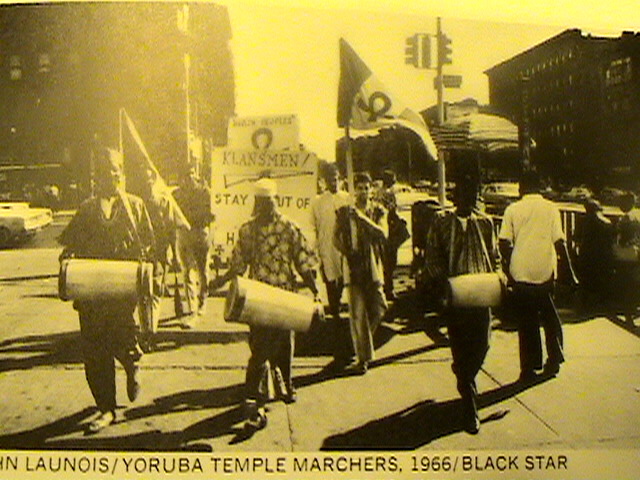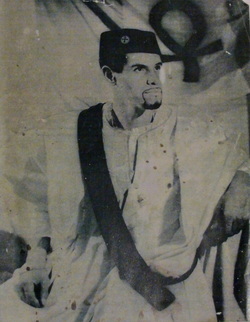On August 26, 1959, Oba Waja became the first African born in America to become fully initiated into the Orisa-Vodun African priesthood by African Cubans in Matanzas, Cuba. This marked the beginning of the spread of Yoruba religion and culture among African Americans. With a few followers, and after dissolution of the Order of Damballah Hwedo, Oba Waja found the Sango Temple in New York and incorporated the African Theological Arch
Ministry in 1960. The Sango Temple was relocated and renamed the Yoruba Temple the same year.
In the fall of 1970, Oba Waja found the Yoruba Village of Oyotunji in Beaufort County South Carolina, and began the careful reorganization of the Orisa-Vodu Priesthood along traditional Nigerian lines. He was initiated to the Ifa priesthood by the Oluwa of Ijeun at Abeokuta, Nigeria, in August of 1972. Baba Adefunmi was proclaimed Alase (Oba-King) of the Yoruba of N. America at Oyotunji Village in 1972.
In 1981, the Caribbean Visual Arts and Research Center in New York sponsored Oba Adefunmi to be a presenter at the first World Congress of Orisa tradition and culture at the University of Ile-Ife, Nigeria. After his presentation, his Divine Royal Majesty King, Okunade Sijuwade Olubuse II, the “Ooni” of the ancient Yoruba city of Ile Ife,Nigeria, summoned Adefunmi and ordered the Ife Chiefs to perform coronation rites on him; Thereafter becoming Oba Ofuntola Oseijeman Adelabu Adefunmi I. Oba Adefunmi I became the first in a line of new world Yoruba Kings consecrated at the palace of the Ooni of Ife. He was presented with a special ceremonial sword of state, incised with the name of his Liege Lord the Ooni of Ife.

In the summer of 1993, Oba Adefunmi supervised the establishment of Ijo Orunmila Igbo Mimo, the first African American Ifa society. During the fall of 1993, he became the only official representative of traditional religion, to address the Parliament of World Religions in the one hundred year history of that organization.
Oba Adefunmi I married several times during his lifetime and fathered six princes and sixteen princesses. He has designed and contributed the major finance for most of the public buildings and temples at Oyotunji and worked on many of its numerous monuments and decorative carvings. Oba Adefunmi fostered the establishment of Yoruba Temples and Shrines in New York, Chicago, Los Angeles, Philadelphia, Milwaukee, Indiana, Georgia, North Carolina, Connecticut, Ohio, Florida, Maryland, DC, VI, Panama and England.
He and his initiates have initiated thousands of priests into the ministries of Orisa-Vodun. In so doing, Oba Adefunmi restored to the African American the ancient sacred priesthoods of the deities, Esu, Orunmila, Obatala, Osun, Yemoja, Ogun, Oya, Sango and Olokun; restoring the African descendants the rites of Gelede, Egungun and Ancestor worship.
Oyotunji African Village is a village located near Sheldon, Beaufort County, South Carolina that was founded by Oba Efuntola Oseijeman Adelabu Adefunmi I in 1970.
Oyotunji Village covers 27 miles. During the 1970s, the era of greatest population growth at the village, the number of inhabitants grew from 5 to between 200 and 250. (Goldstein, Hunt, and McCray) The population is rumored to fluctuate between 5 and 9 families as of the last 10 years. It was originally intended to be located in Savannah, Georgia, but was eventually settled into its current position after disputes with neighbors in Sheldon proper over drumming and tourists.
2015 THE JOURNEY BEGINS WITH IGBEGA ALADE;
CELEBRATING THE LIFE AND LEGACY OF HRH OBA EFUNTOLA OSEIJEMAN ADEFUNMI I
ENSURING CONTINUED LIGHT AND ELEVATION OF OUR GREAT FATHER
Osagiyan Palace, Oyotunji Village [January 1, 2015] – In the same sense that children of certain Orisa find themselves compelled to experience the traditional ceremonies and rituals for that particular deity; Igbega Alade is a time designated for the children born into Orisa through Ile Adefunmi to pay homage to or gain a deeper understanding of the cultural custodianship that Oba Waja sowed so selflessly and fanatically into our greater community. From February 06-08, 2015 OAV will host the 7th Annual Igbega Alade Festival at 56 Bryant Lane, Sheldon, SC 29941. Admission to this year’s festival is $15/festival-adults (Saturday and Sunday early-bird online rate) and $20/festival-adults (Saturday and Sunday gate-rate); donations are welcome for Friday.
An electronic donation of only $10 allows a candle to be lit from you for Oba Waja, ensuring continued light and elevation, during the Candle Light Parade. Purchase below. [Be sure to email your name and special words/prayers for Oba Waja to info@oyotunji.org].
COMPLETE OUTLINE OF 2015’S IGBEGA ALADE FESTIVAL:
|
Friday- Opening Day
9am– Ebo to Royal Ancestors 6pm– Opening Ceremony 7pm– Meet & Greet 8pm– Cultural Film Screening |
Saturday-Main Day
7:30am– Alawemo (Town cleaning and purification) 9:00pm- All white affair 11:00am– Opening prayer at Oba Efuntola’s shrine 1:00pm– Lecture Series [Examining Oba Efuntola’s writings/drawings] 3:30pm– Egungun Parade 5:30pm– Candle Light Parade |
Sunday–Closing Day
7:30am-Alawemo (Town cleaning and purification) 11:00am-Obatala Worship *Presentations from Egbe immediately following |
this festival allows us time to examine and review the legacy that imparts to us an incredible view of creative and expansive thinking; a tool that is
desperately needed for truth and navigation in these days and times.The 8th Annual Igbega Alade Festival, from February 06-08, 2014 at 56 Bryant Lane, Sheldon, SC, 29941. Admission to this year’s festival is
$15/festival-adults (Saturday and Sunday early-bird online rate) and $20/festival-adults (Saturday and Sunday gate-rate); donations are welcome for
Friday Email us at Info@oyotunji.org for more information.
PHOTOS Gallery of IGBEGA ALADE …
AFRICAN THEOLOGICAL ARCHMINISTRY [ATA]
The mission and vision of the African Theological Archministry is to organize and create places of worship while teaching the spiritual technologies,cultures and heritages of all African-based people by creating an institution that will inspire and empower all people to consider the possible use of
ancient African traditions as a basis to revitalize our families, communities, oceans, rivers, lakes, animals and soil. The calling card of ATA is cultural
restoration through innovation and usefulness. ATA’s future goal is to cultivate a united intergenerational collection of traditional chiefs, leaders,
dignitaries including African Traditional Religious devotees and Pan-African professionals who share and distribute educational programs and materials.
Materials from http://www.oyotunji.org/ and Researched by Veronical Olayinka Adesina, posted and edited by ‘JIDE ADESINA
Materials from http://www.oyotunji.org/ and Researched by Veronical Olayinka Adesina, posted and edited by ‘JIDE ADESINA


































